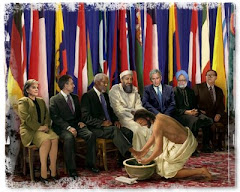all kinds of different ideas, that quite frankly i haven't wrestled with for some time. still in conversation with a brother in christ at work, and the latest topic is election or maybe better put, god's sovereignty. i am coming from the viewpoint of without choice - real choice - then how can there be love? if i haven't had the ablility to choose or deny god since my birth, what is the deal? i believe he is coming from the reformed theological viewpoint (i say think, b/c i really don't know) that god has divinely chosen who will be the elect and who will not.
now - if we serve an all good, all powerful and all knowing god then i have to trust whatever the real deal is, it is right and just. but this is tough stuff. this brings up tons of other questions, and maybe i will wrestle with more of them on this blog at a later time.
suffice to say right now, i am glad i "bumped" into this fellow and have enjoyed the relationship we have formed. he is earnestly seeking to get me to "see the light" and i am returning the favor, but we are not beating each other to a pulp - at least most days.
so if are reading this - what do you think? free will or not free will? or is that even the issue here?
Thursday, February 7, 2008
Subscribe to:
Post Comments (Atom)



4 comments:
Today I was listening to Driscoll on sexual sin. He said of sexual sin, "If you don't confess and repent you'll go to hell". I thought interesting in light of his recent lesson on predestination. I guess he was not talking to the elect so I'm not sure why he brought it up other than the fact that it would make for a better life before the non-elect go to hell.If no free will why preach repentance or preach at all for that matter?
and so goes the struggle. i have not good answer to your questions.
I encountered an article this month that seems to relate:
"...Here is where many saints falter in their Christian witnessing. They read something in the Word about predestination and then reason that God predestinates some people to be saved and some to be lost. That is not the case; predestination is never about the lost man being saved or lost; rather, predestination is about the saved man. We need to read the context where it speaks of predestination, to clearly understand that salvation is a personal matter based upon the "whosever wills."
"Predestination is for the saved man. God knows who is going to be saved, and He has predestinated certain blessings to those who will be saved by faith. In other words, God draws a circle, figuratively speaking, and says that whosoever believes in the Lord Jesus will get in that circle. So the believer, upon his faith in Christ, steps into that circle. Then God says, figuratively speaking, "Whosoever is in that circle by faith, I have predestinated them to receive these blessings..." "
From Dr. Mark G. Cambron (d. 2000)
Regarding election:
"The New Testament words 'chosen, choose, and election' are the same. The Old Testament word is simply 'chosen.' From [Eph 1:4] many think God chooses some to be saved and some to be lost. Again, I point out -- predestination and election (choosing) have nothing to do with the lost, but are for the saved."
"The following Scriptures tell us what the choosing, or election, of God is about: 'For this is the word of promise, At this time will I come, and Sarah shall have a son. And not only this; but when Rebecca also had conceived by one, even by our father Isaac; (For the children being not yet born, neither having done any good or evil, THAT THE PURPOSE OF GOD ACCORDING TO ELECTION MIGHT STAND, not of works, but of him that calleth;) It was said unto her, THE ELDER SHALL SERVE THE YOUNGER. As it is written, Jacob have I loved, but Esau have I hated' Rom. 9:9-13.
At once we see that election or choosing has to do with service-- THE ELDER SHALL SERVE THE YOUNGER. It does not say, 'The younger shall be saved, and the elder shall be lost.' No, but, 'the elder shall SERVE the younder.' Thus election has to do with service. 'Jacob have I loved, but Esau have I hated' wasn't said of these two men before they were born, but hundreds of years after they died. God hated the descendants of Esau because of their unbelief, and loved the descendants of Jacob because of their faith."
"In John 15, the Lord Jesus said--He had chosed (elected) them disciples. For salvation? No, for service. Even Judas was chosen! For damnation? No, but like Pharaoh, who has a fit vessel unto wrath--after being given many chances to believe, he refused, and thus was used for God's purpose.
"The prophet Isaiah says that Israel is God's chosen people (Isaiah 41:8). Does this mean that all Jews are saved? No. It simply means that God has chosen Israel for a service..."
"Back to Ephesians 1:4--what has God elected or chosen for us, or what has He elected, or chosen us for? Not salvation, but He has chosen us before the foundation of the world (He knew we would believe on His Son) for service--"that we should be hold and without blame before him in love."
From Dr. Mark G. Cambron
This was a new (and understandable) perspective for me to consider.
Isaac
Post a Comment